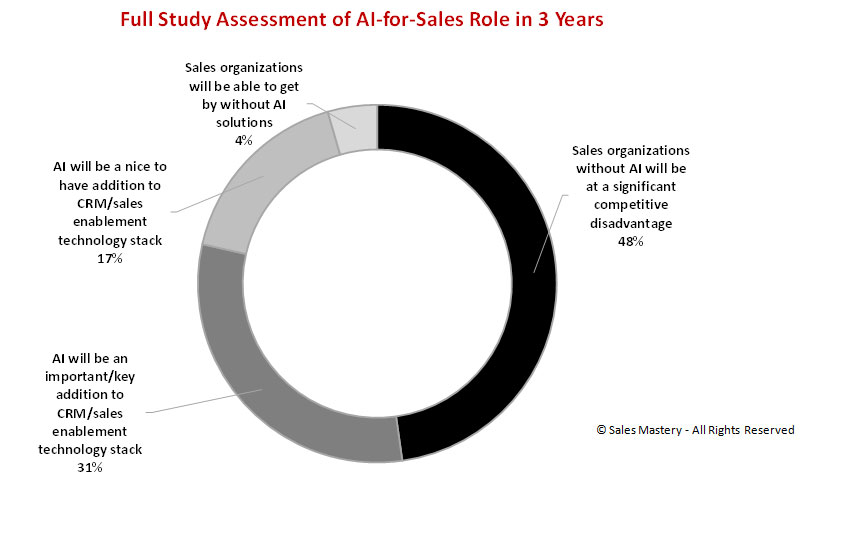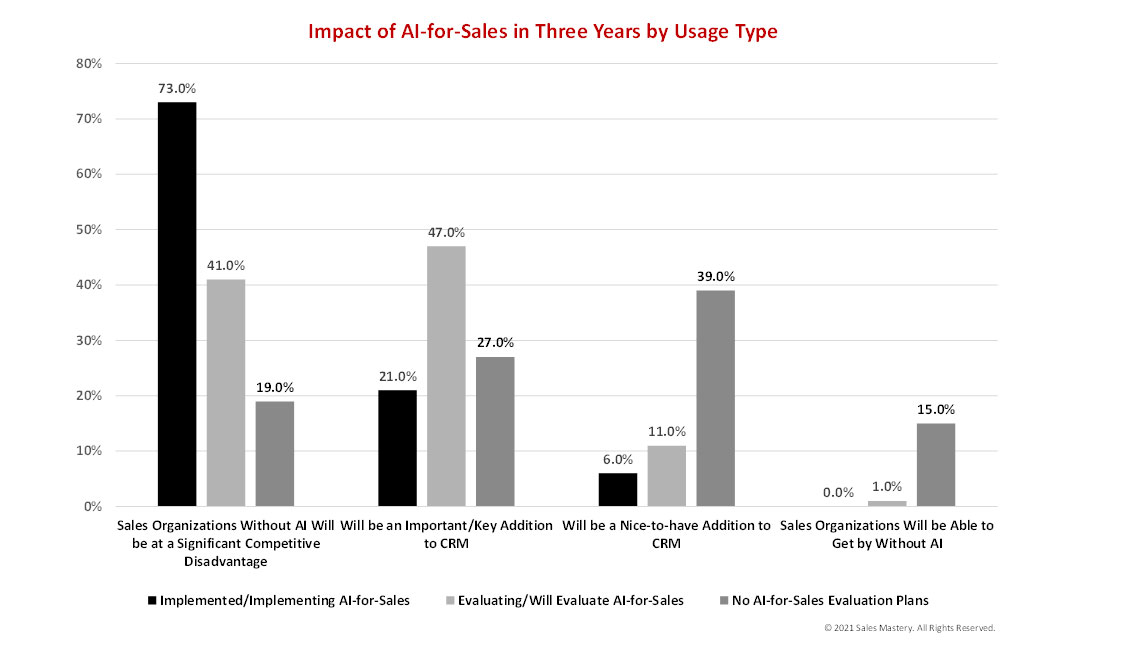While Sales Mastery had benchmarked AI-for Sales initiatives since 2016, we didn’t conduct a detailed marketplace survey until 2019. In that initial report we observed AI-for-Sales was in its embryotic stage in terms of being utilized by sales organizations. And we noted that the attitudes toward the impact that AI could/would have on sales spanned the gambit from being viewed as the single factor that will decide which companies thrive or die on one end of the spectrum to being seen as the next iteration in a series of over-hyped technology fads. Based on those wide range of views, we were looking forward to seeing what the evolution of trends looked like on an annual basis, as the AI-for-Sales market further matured, and opinions began to be replaced with perspectives based on real-world experiences.
Fast forward to today, in our 2021AI-for-Sales study conducted in the second half of last year, we received input from 500+ sales executives. Reviewing their input, a clearer picture of how AI space is evolving emerged from three different perspectives; those companies that have implemented AI solutions, those that are evaluating or plan to evaluate AI solutions in the next 12 months, and those sales organizations that have no current interest in investigating if/how AI could impact their sales performance.
A question we asked all participants, based on their current understanding of AI-for-Sales (which could be insights gained from firsthand experience as actual users, all the way to SWAGs based on little or no direct knowledge on the topic), was what did they perceive the impact that AI would have on the ability of companies to sell three years from now. The following chart summarizes the responses from all the participants.

Reflecting on other technology studies we conducted over the past two decades; we have often seen a third-year swoon. Early hopes for what technology could do runs into the wall of reality for what it actually does, and the optimism for the future takes a corresponding hit. So far, that doesn’t appear to be the case for AI-for-Sales. The percentage of study participants that indicated that sales organizations will be able to get by without AI solutions remained at 4%. Those who indicated that companies without AI will be at a significant competitive disadvantage increased from 43% to 48% last year-over-year.
While the previous chart showing the aggregated analysis of all respondents is useful, macro-level averages can hide other insights. Based on the three segments profiled earlier, we further segmented the data which revealed sharper disparities (see chart below). The majority of participants whose sales organizations had firsthand experience leveraging AI-for-Sales solutions see it as a key addition to their tech stack, if not an outright game changer, for the world of sales in three years. Participants at companies with no current interest (and no implementation experience) are far less positive on the future role of AI.

Further segmentation was conducted to analyze responses from participants at firms that are currently in the evaluation process compared to those who plan to evaluate. Of the firms that are currently evaluating (and getting more insights into what AI can do), 58% rated AI as representing a significant competitive edge. This is compared to only 20% from firms that were planning to evaluate.
In 2022 we still see AI-for-Sales in the early adoption stage, with an overall marketplace penetration percentage in the single digits. But the notable differences in the assessment of the impact AI will have on the future of sales suggest that the organizations that have not invested the time and effort to at least educate themselves on what their peers are/will be doing may be well served to do so. The less they find themselves trying to play catch-up in the race to optimize and transform sales the better they will be.
© Sales Mastery – All Rights Reserved
— Jim Dickie, is a Research Fellow for Sales Mastery, a research firm that specializes in benchmarking case study examples of how companies are leveraging technology to transform sales. He can be reached at jim@salesmastery.com or at @jimdickie












